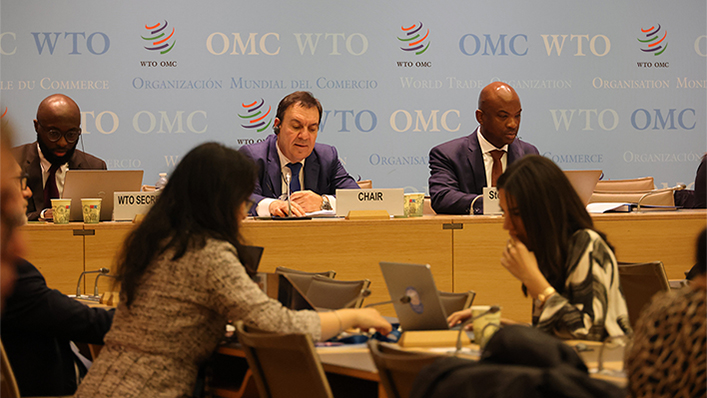
At the DGCFMC meeting on 28 November, WTO Deputy Director-General Jean-Marie Paugam congratulated Benin and the International Cotton Advisory Committee for successfully hosting and organizing World Cotton Day 2024 on 7 October. He particularly commended the excellent coordination of the event, emphasizing its focus on value addition and the transformative potential of the cotton sector.
The Cotton 4+ countries (Benin, Burkina Faso, Chad, Mali and Côte d’Ivoire) emphasized the need for a cotton farming community supported by improved trade practices, a higher level of participation in value chains, and international cooperation. Speakers reiterated their readiness to work with investors and donors to develop the potential for the cotton sector in their countries.
Representing the Partenariat pour le coton, the United Nations Industrial Development Organization (UNIDO) unveiled a transformative roadmap to establish the African region as a sustainable textiles and garments hub by 2035.
The African Export-Import Bank (Afreximbank) presented insights from a recent webinar on crafting bankable project proposals for cotton value chain development, spotlighting accessible financial and technical support for eligible projects.
The Chair, Deputy Director-General Jean-Marie Paugam, concluded the meeting by outlining some immediate priorities and strategic opportunities for the cotton sector. Firstly, he emphasized the importance of advancing efforts in recycling cotton products and exploring the use of cotton for medical purposes. These innovative directions, he noted, align well with emerging investment opportunities and deserve further exploration to unlock their potential.
Secondly, significant interest was expressed by South-South cooperation partners in leveraging the outcomes of UNIDO’s work on the Partenariat pour le coton. The results were viewed as a valuable roadmap to guide investment and collaboration efforts, offering a practical tool to energize initiatives in the sector. He also highlighted Brazil’s potential interest in joining the Partenariat, recognizing it as an opportunity to foster new avenues for collaboration and the exchange of expertise.
Finally, he reiterated that access to financing remains a critical issue for the cotton sector. While acknowledging progress made in collaboration with Afreximbank, he stressed the need to deepen these efforts. Exploring alternative approaches, such as seminars or technical assistance, was suggested as a means to advance the discussion and deliver tangible outcomes.
The C4+ countries emphasized how subsidies distort global markets and hinder growth, calling for reforms to ensure fair trade practices. Cotton is more than just a commodity, they said, stressing its potential as a tool for poverty alleviation, sustainable development and regional economic prosperity.
The C4+ noted, in particular, with concern that the revised WTO Background Paper updating developments on cotton trade measures introduced by the WTO Secretariat during the dedicated discussion demonstrated that some members continued to provide high levels of support to cotton and that the share of least developed countries (LDCs) in world cotton trade had declined from 10% in 2013 to 7% during the period 2020-2023.
A key concern was the slow progress in global trade negotiations on cotton, which have been ongoing for over two decades. The C4+ remained open regarding the process to be followed in the negotiations provided it preserved cotton’s specificity and past mandates. Several members supported addressing cotton separately but stressed the need for alignment with broader agriculture negotiations.
The ICAC presented an update on the global cotton market, forecasting a 4.7% increase in world cotton production, with world cotton mill used expected to increase only by 1.7% in 2024-25, with total production and consumption both reaching around 25.4 million tonnes. Cotton exports were expected to stay relatively high at 9.7 million tonnes.
The International Trade Centre (ITC) made a presentation on the Cotton Portal, a collaborative initiative with the WTO to improve access to cotton trade data, market regulations and export statistics. The ITC and the WTO Secretariat reiterated their willingness to work closely with WTO members, including the C4+, to develop the use of the portal in Africa, following the two webinars held in French and English organized in the margins of the previous dedicated discussions.
C4+ countries also updated members on recent crises affecting the cotton sector, such as climate change and high input prices, that hamper cotton production and threaten livelihood of people depending on it.
Both meetings emphasized the urgency of tackling barriers in the global cotton sector while advancing sustainable solutions. Speakers called for collective action to transform the cotton industry into a driver of economic resilience and social development, particularly for the world’s poorest cotton producers.
Share
Reach us to explore global export and import deals